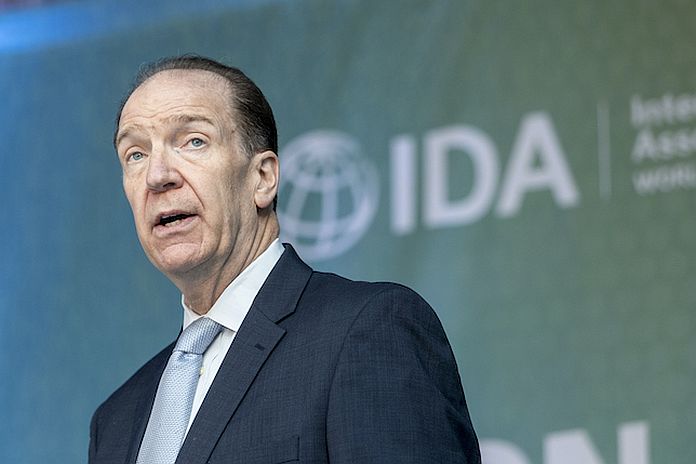By David Malpass
The COVID-19 pandemic has hit the poorest and most vulnerable people in developing countries the hardest, worsening inequality and exacerbating existing challenges—insufficient health care systems, education deficits, stagnant incomes, rising conflict and violence, poorly-selected debt contracts, and climate change. Unfortunately, the delays in beginning the vaccination process in developing countries are deepening global inequality and leaving hundreds of millions of elderly and vulnerable at risk.
Beyond the pandemic’s immediate harm, COVID-19 is leaving lasting scars: children missed vital schooling and related childhood nutrition and vaccination programs; businesses collapsed with job skills lost; savings and assets have been depleted, and debt overhangs are depressing investment and preventing urgent social spending.
The World Bank has moved quickly to help countries respond in three steps – 1) emergency health programs in more than 100 countries early in the crisis, 2) vaccination readiness assessments completed in over 140 countries by the end of 2020, and 3) COVID-19 vaccination financing and delivery operations that will reach at least $4 billion of commitments in 50 countries by mid-year.
The International Finance Corporation (IFC) our private sector development arm, is helping to increase the supply of vaccines and critical health equipment.
Widely available vaccination is the best investment to strengthen the recovery, and I’ve repeatedly urged countries with sufficient vaccine supplies to release them as soon as possible to developing countries with delivery programs in place.
In addition to vaccination programs, we’re working to focus our financing and expertise on impactful programs that will save lives and livelihoods, while supporting green, resilient, and inclusive development. The developing world needs sustainable growth that is broad-based and strong enough to lift hundreds of millions of families out of poverty, while integrating both development and climate.
To help countries address climate-related goals, the World Bank Group will commit at least 35 percent of our financing over the next five years – totaling $100 billion – to support developing country climate investments. More important than the amount spent is the results. To address current needs, part of our climate financing will be used for high impact “mitigation” efforts to reduce greenhouse gas emissions (GHG), particularly by large emitters.
Looking toward the future, at least half of our total climate finance will be for high impact “adaptation” efforts, to help countries prepare for harmful climate effects. Our focus on adaptation recognizes the reality that climate change hits the poorest countries hardest, even though their contribution to GHG emissions is minimal. One of our immediate actions is helping countries with their nationally determined contributions (NDCs) and long-term low carbon development plans. Countries have widely varying approaches to Paris alignment, and it is important that their climate efforts maximize impact on both GHG emissions and successful adaptation.
Adding to inequality, many of the poorer countries are coping with record debt burdens that charge high-interest rates, even as rates in advanced economies stay near zero. Even before the pandemic, half of all low-income countries were already in debt distress or at a high risk of it. When the pandemic struck, I called for debt relief for the poorest countries starting with an immediate moratorium on debt service. The G20’s Debt Service Suspension Initiative (DSSI) provided temporary relief for 43 countries to postpone around $5.7 billion in debt-service payments between May and December of 2020, with further payment deferrals of $7.3 billion possible in the first half of 2021.
The relief has been less than anticipated because not all creditors participated in the initiative – these non-participating creditors continued to collect billions of dollars in interest and principal payments during the crisis – and because debtor countries will also owe the suspended payments, plus interest, when the suspension period ends in December 2021.
In April, the G20 announced a common framework under which countries with unsustainable debt burdens could achieve a moderate debt position. Working with the IMF, we’re supporting the implementation, but many of the sovereign debt contracts made in recent years contain provisions that make debt analyses and restructurings difficult, including collateralization, non-disclosure clauses, and impediments to comparable treatment. History shows that countries with no way out of overhanging debt burdens don’t grow and don’t achieve lasting reductions in poverty.
The policy imbalance in fiscal and monetary stimulus is another important contributor to inequality, both within and among countries. Fiscal stimulus and COVID-related support measures are concentrated in the advanced economies, and these efforts are failing to help people in the developing world. We can see this as prices spike – driven by demand in advanced economies – even as food insecurity hits huge swaths of the world’s poor. Global monetary policy suffers from an even greater imbalance because central bank bond-buying and credit regulation direct resources to only the safest, most sophisticated institutions, crowding out other borrowers.
Our collective response to poverty, inequality, and climate change will be defining choices of our age. The challenges are immense, requiring new approaches in both developing countries and advanced economies. The World Bank Group is dedicated to helping countries achieve constructive change and sustainable development as we work with the public and private sectors toward our core mission of alleviating poverty and boosting shared prosperity.





